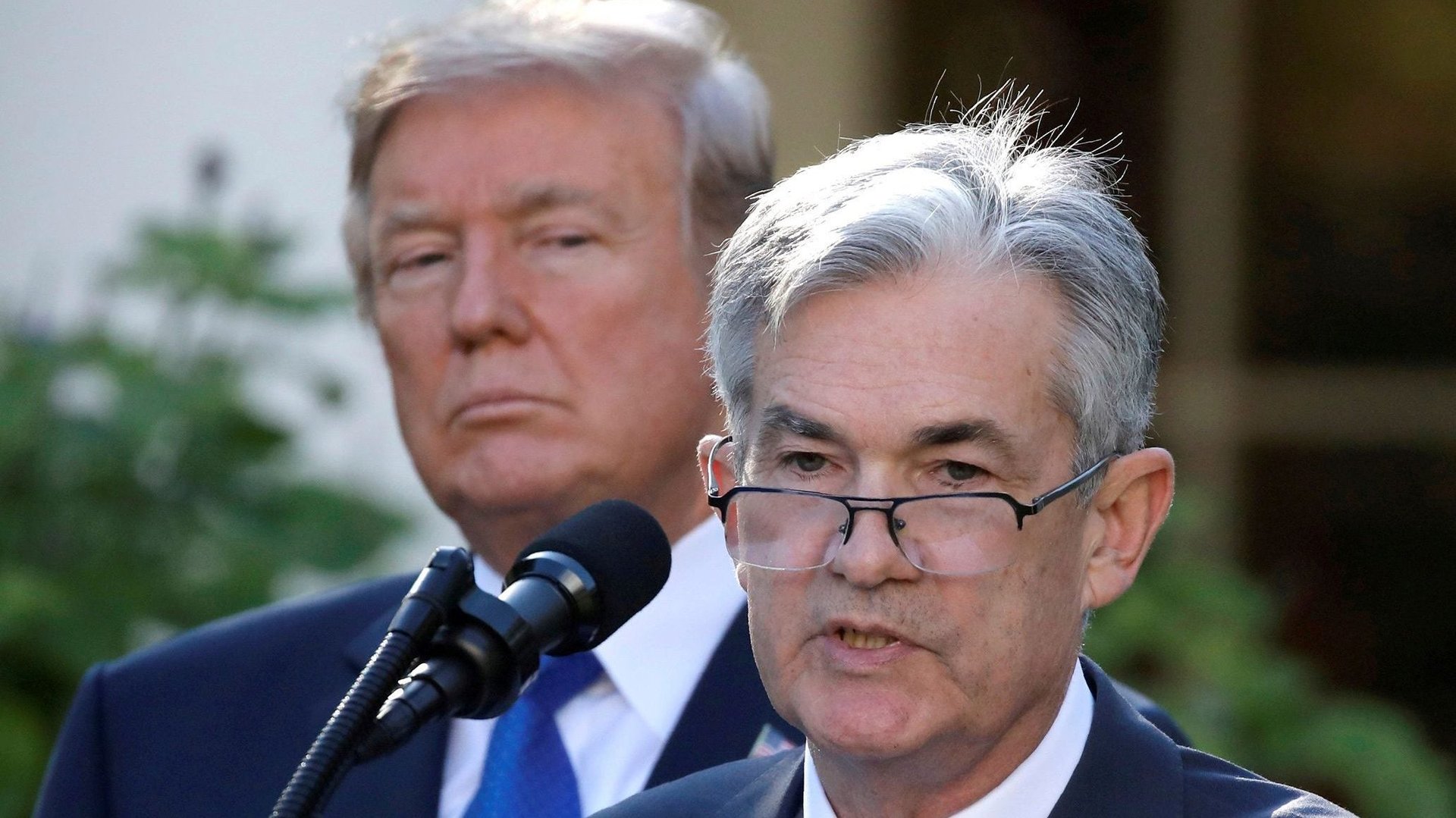“Markets would erupt”: What happens if Trump fires Fed chair Jerome Powell
Donald Trump has reportedly discussed firing Jerome Powell, chairman of the Federal Reserve, out of frustration with his decisions to continue raising interest rates, according to sources who spoke to Bloomberg (paywall).


Donald Trump has reportedly discussed firing Jerome Powell, chairman of the Federal Reserve, out of frustration with his decisions to continue raising interest rates, according to sources who spoke to Bloomberg (paywall).
The move would be an unprecedented infringement on the central bank’s autonomy and independence, and it would almost certainly cause additional market turmoil. An expected changing of the guard at the Fed can lead to volatility and market uncertainty, and the markets are already jittery (paywall). The Dow just had its worst week since 2008. However, it’s unclear whether Trump has the legal authority to remove Powell.
The US president “has talked privately about firing Powell many times in the past few days,” Bloomberg reported late last night (Dec. 21). He has also begun asking advisors whether they believe he has the legal right to do so, according to CNN. There’s reason to take the rumors seriously: Over the past several months, similar reports of Trump’s musings surfaced in the days before the president pushed out Jeff Sessions, the former attorney general, and John Kelly, the chief of staff who is set to leave by month’s end.
Trump’s dissatisfaction with Powell has apparently been provoked by the markets’ performance and the Fed’s rate hike this week. As the Mueller investigation and other threats to Trump’s power and popularity grow more serious by the day, the strength of the US economy has given Trump a positive talking point in appeals to supporters. Now several indicators are pointing to a recessionary environment. Trump has argued that raising interest rates—which makes borrowing money more expensive, but can help the central bank control inflation—will negatively impact the economy. On Tuesday, he urged the Fed to “feel the market,” and not simply read the “meaningless numbers.”
The next day, Powell announced a rate increase and signaled that the Fed would stay the course.
The central bank is designed to act independently, so that it can continue to make the best monetary policy decisions for the sake of the American public, without influence by partisan politics or a single personality in the White House. A governor may be “removed for cause by the President” under the Federal Reserve Act, and the chairman of the Fed is a governor. However, the rules about central bank leadership are opaque, Bloomberg notes, citing legal expert Peter Conti-Brown of the University of Pennsylvania, author of The Power and Independence of the Federal Reserve (Princeton University Press, 2017).
Trump’s closest advisors are said to be urging the president not to take any action against Powell. The hope is that the president will drop the subject as the holidays arrive. Quartz reached out to the White House but did not receive an immediate reply.
Trump has already broken with Fed-White House tradition. For decades, Fed chairs have seen their four-year terms renewed, even when they were appointed by the president of the opposing party. Last February, Trump did not renew former Fed chair Janet Yellen’s term; Yellen had been appointed by president Obama. Trump instead installed Powell, a lawyer and investment banker.
This is not the first time that Trump has raised questions about Powell’s leadership. In October, Trump commented that he wouldn’t fire Powell, proving that he had been weighing that possibility. That same month, in a complaint about the Fed’s policy of gradually raising interest rates, he said, “I think the Fed has gone crazy.” He also acknowledged the Fed’s independence in an interview with Fox News in which he said, “My biggest threat is the Fed.”
However, these are the first reports that Trump is actually talking about perhaps firing Powell, and asking for his advisors’ opinions.
In a story published today, Bloomberg gathered investor and analyst views on the risks involved in this hypothetical situation. “[T]raders didn’t rule out a bounce—whether on reflexive disdain for Powell’s policies or simply because of the steepness of last week’s decline,” journalists Vildana Hajric and Elena Popina wrote. But the majority of those interviewed believed the consequences would be dire.
Nick Sargen, chief economist with Fort Washington Investment Advisors, said that the “markets would erupt.” Powell’s removal “would be construed as a loss of the Fed’s independence,” he said, “and the dollar would sell off along with stocks.”